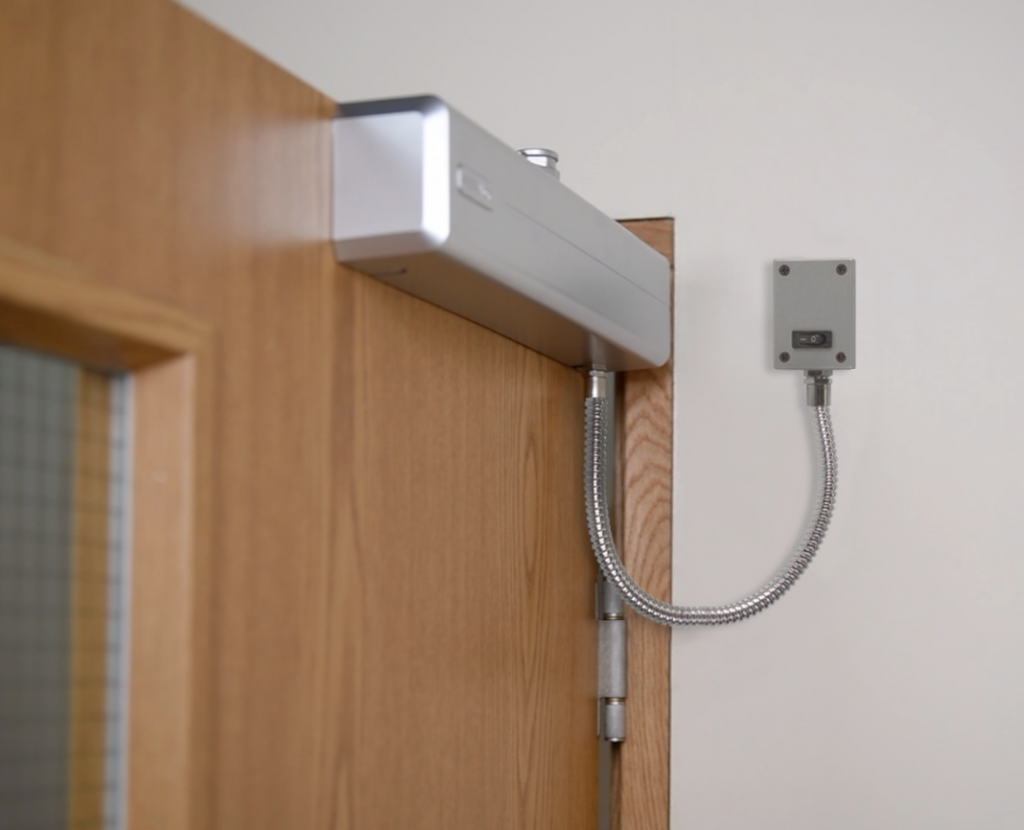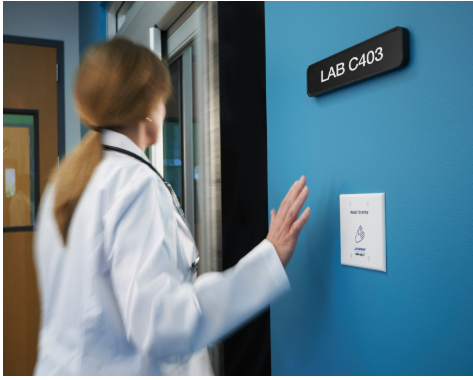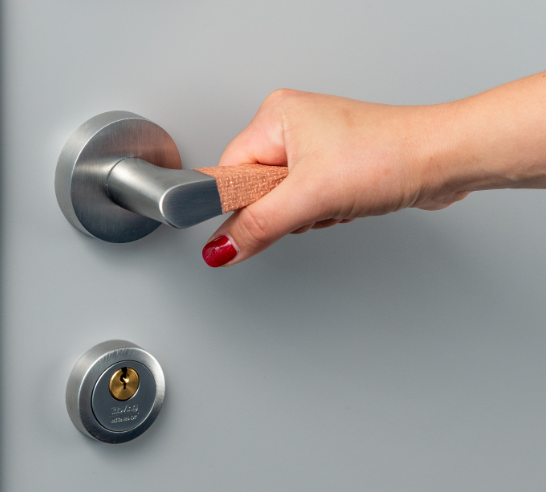With the outbreak of Covid-19, reducing touchpoints wherever possible throughout a building is front of mind for many businesses, building owners and facilities managers. Fortunately, there are a range of hands-free door opening solutions – available to suit all budgets and needs – that can help minimise the spread of infection, says the ASSA ABLOY Door Hardware Group.
Doors and their hardware are the first and last touchpoints when entering or exiting a building, or when moving between different rooms. However, there are options available that can either limit the amount of direct contact with ironmongery and doors or offer an anti-bacterial solution.
Eryl Jones, Managing Director at the ASSA ABLOY Door Hardware Group, comments: “Doors are the one item we all touch every day; a physical barrier to keep us secure and safe. But with the increased risk that touching a door now poses, what can we do to overcome this challenge?
“When looking to limit the spread of infection from doors and kill germs, the first place to start is to make sure existing door hardware is being cleaned properly. As one of the most commonly touched surfaces in a building, it is vital that a regular cleaning routine is established. First, hardware should be cleaned with a mild, non-abrasive anti-bacterial detergent and water solution, using a soft cloth. Then, using water and a soft cloth only, surfaces should be wiped to remove any remaining detergent residue. The treated surface should appear visibly wet then allowed to air dry.
“Further advice on how to clean door hardware properly can be found on our website at www.assaabloyopeningsolutions.co.uk/cleaningdoorhardware.
“For those seeking a more secure solution in areas with high traffic, decision makers might want to consider products that allow doors to be opened without a person having to use their hands. For instance, arm and foot pulls are an easy and cost-effective door furniture solution that limits the level of contact an individual has with a door.
“Alternatively, sites might want to think about products that feature anti-microbial surfaces. Hardware treated in this way, or that use materials such as copper, can effectively reduce the risk of transmission. To meet this need, UNION has launched GripSafe, an anti-viral copper door handle tape that simply wraps around a clean door handle and has been proven to inactivate 99.98 per cent of corona viruses. This offers a simple solution that can make a big difference.

“The next step up would be to look at hold-open door controls, which can help keep doors open at all times, except in the case of an emergency. For instance, ASSA ABLOY offers its DC300G-HF door closer, which holds doors open in medium to high traffic corridors, allowing people to pass through without touching the doors. Meeting the demands of BS 8300:2018-2 for inclusive design, it offers unrivalled performance when compared with other door closers on the market. UNION also offers DoorSense, a safe and legal means of keeping fire doors open, but which enables a fire door to close automatically in the event of an alarm.
“For those after a completely hands-free solution, there are a range of access control devices that simply require the wave of a hand to open. These are fitted with motion-sensing technology, and ideally suited to sensitive applications such as bathrooms, and environments such as hospitals, laboratories and schools.

“Finally, there’s also the option of access control solutions that use personalised keys. Sharing keys between personnel can quickly increase the spread of bacteria and germs. An access control system that employs individual keys puts a stop to this, while simplifying key management throughout a site and saving personnel valuable time and money. Solutions such as ASSA CLIQ® Remote, which is a mechatronic locking system that assigns access rights to a key, allows users to have their own personalised keys for all doors and eliminates the need to share keys. This reduces the risk of bacteria and germs spreading.
“By taking these steps and considering the door hardware options available to them, decision makers can help make sure our buildings mitigate the risk of germs and stop the spread of infections, ensuring everyone feels as safe and comfortable as possible in these spaces.”
Find out more about how the ASSA ABLOY Door Hardware Group can help by visiting www.assaabloyopeningsolutions.co.uk/handsfree

